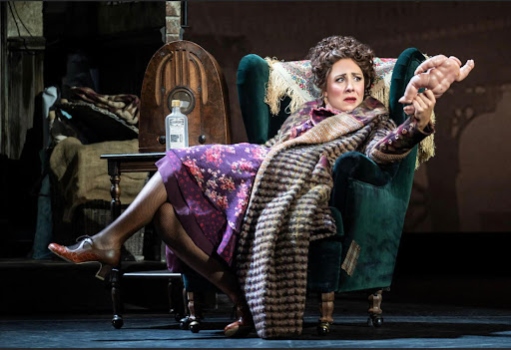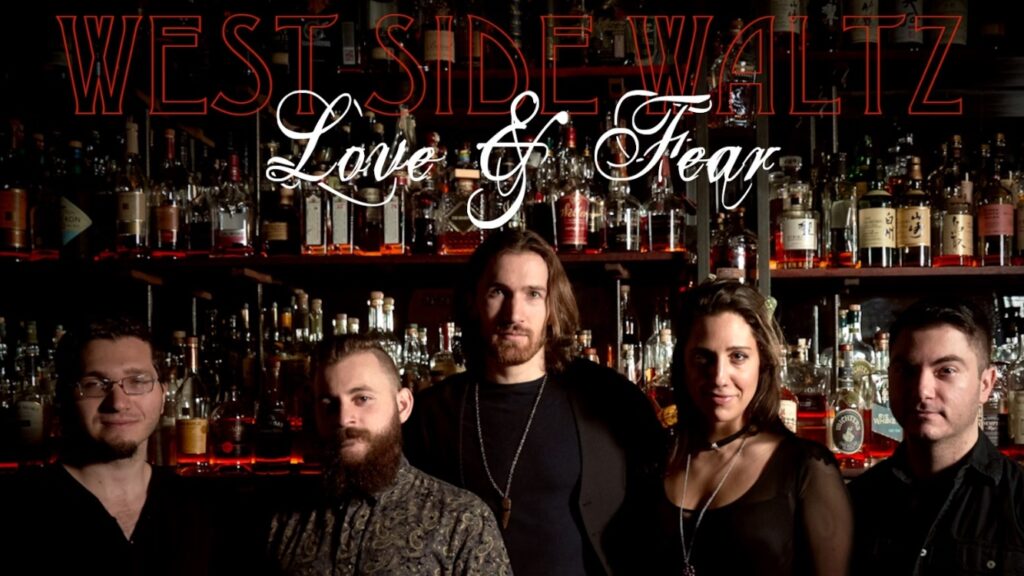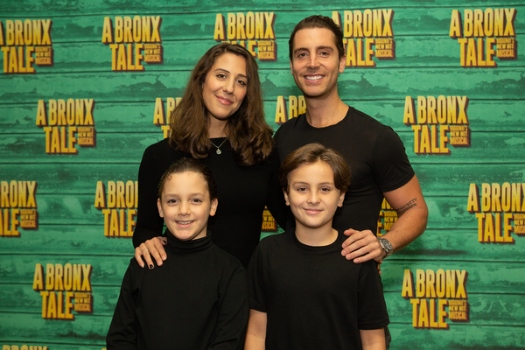I had an absolute blast chatting with actor (My Name is Asher Lev; the National Tours of A Bronx Tale, Fiddler on the Roof, and Annie) and musician (West Side Waltz; the Voxies) Stefanie Londino a few weeks ago for the podcast. As noted, Stefanie is currently touring the country, and likely coming to a city near you, as Miss Hannigan in the National Tour of Annie on which I worked. Because of that connection, I obviously knew her long before we recorded the pod, and we had worked side-by-side and even hung out a bit outside of work, but recording the podcast was a great opportunity for me to get to know Stefanie on a deeper level, and get into some of the topics one doesn’t normally cover on, say, a 20-minute break from rehearsal, in between scarfing down a string cheese and trying to remember your to-do list.
One of those topics was the privilege of getting to do what we do. When I speak with Stefanie about her childhood and adolescence, and what made her go into professional acting, she talks about how her home was filled with music, art, and culture, but that when she declared, around 17, that she wanted to pursue theatre professionally, and perhaps even go to college for it, her announcement was met with dismay. I think that’s a classic, and understandable, story. Books, movies, TV shows, even theatre itself has waxed poetic for decades about how difficult this profession, and this business, is. How you won’t make money. How you’ll have no sense of agency or power over your own career and life. How you will be constantly told you’re not good enough and constantly rejected. How even when you do work, how you’ll miss birthdays, weddings, baby showers, life events. How difficult it will be to have any kind of normal family life, or even a “normal family.” I’ve talked about many of these aspects of the business on the podcast and on Arts Journal.
“[My grandpa]…the most Italian…Lorenzo Londino, this auto mechanic of a guy,” Stefanie explains on the podcast, “he was crazy about country music. So yes, music was there. And on my mom’s side, my grandpa was very musical, played several instruments, piano, the accordion. And had a beautiful voice, but no professionals on either side. I think it was a byproduct of being from immigrant families on both sides, both sets of grandparents are right off the boat. And I think there’s a concept of art as a luxury in those cultures, especially coming to the States and having to struggle and make a living out of two pennies or whatever you had in your pocket. So…in the beginning, everyone tried to talk me out of it because it didn’t seem practical.” “Piggybacking off of that,” Stefanie continues, “it was [also] a big deal for my parents who did not go to college, that their children would go to college. [So there] was lots of emphasis on grades and extracurriculars as resume building…in order to be desirable to colleges, to be able to go to a great college and get educated. That was the dream for them…[so when I started] auditioning for programs, by that time I was pretty sure this is what I wanted to do, but there was no mold for that. In my family…no one had done that…And so there was a ton of pushback. And I remember it was one of the very first times I feel like I really defied the wishes of the family. And in my family, this is an Italian Polish family. This is insular. You know what I mean? You don’t defy the wishes of the family.”
I identify with so much of what Stefanie said, and I think many of my readers and listeners can, too. I think I’ve written about or talked about before this sense of “generational guilt” I have: that if I had been born one generation behind (in my parents’ generation), and one step closer to my immigrant great-grandparents, I have a distinct sense that there’s no way I would do what I do. When you’re that close, birth-wise, to the immigrant experience, to coming to America with nothing but the “two pennies in your pocket,” as Stefanie put it so poetically, there’s no way you could pursue a career that so equates with struggle. Struggle was behind the family; struggle was what they hoped to escape in coming to America (especially in my family, who were fleeing the Holocaust or the persecution of the Russian pogroms). I’ve heard people from that earlier generation put it to me this way; you had two choices: doctor or lawyer. That’s it. And none of this “finance” stuff either so don’t get any ideas — that was seen as risky as well. Something stable, that ALWAYS paid well. For which people ALWAYS needed you. And something for which you needed lots of education, which, as Stefanie’s anecdote implies and my own experience in my family confirms, is something on which many American immigrants have particularly fixated.
I tell Stefanie on the podcast, for example, that my great-grandfather, who came to America from Russia, escaping dramatic persecution, and who made his living in New York City as an upholsterer, would not even let me grandfather touch his upholstery tools, as family lore goes. Like many immigrants, he had “bigger” plans for my grandfather, and didn’t want to “trap” him into a cycle of poverty and unskilled work. Of course, my grandfather became a doctor — which was indeed a calling for him — and now, I say sometimes jokingly, I get to make musicals, and decide whether a plastic doll body should go in the stage right side of an armchair or stage left (see below).

What a privilege, right?! What a luxury! And as Stefanie and I both explain on the podcast and in this article…we are both definitely aware of that accident of birth, the fact that if we had been born at a slightly different time, under slightly different circumstances, we couldn’t have followed our passions in quite the same way. Clearly, it was very scary for Stefanie’s family when she made this decision. “But I think in a lot of ways,” Stefanie describes, “it’s [become] novel in a kind of a wonderful, ‘we’ve arrived’ kind of way for my grandparents that I do this professionally.” More importantly, Stefanie describes how, even then, she was aware of the gravity of her decision, and what kind of personality, or strength of character, it might take to truly “make it” in the business, or even just to make a living. “But I felt very drawn to it,” she says. “And I felt I knew I was a tough cookie. I knew that if I put my mind to it, I would make it work, and everyone said, ‘You’ll struggle. You’ll struggle all your life.’ And I thought that would be a worthwhile struggle.”
I can’t think of a more beautiful way of putting it, or of thinking about what it means to make a career in the arts. Stefanie acknowledges that it’s a struggle — no one’s arguing that — but if you have a true passion for it, it’s a struggle that feels “worthwhile” as she put it: valuable, important. As I believe I’ve written about on Arts Journal before, many people go through life with no particular passion. They either have to FIND it, or MAKE it. And I respect that too, but I have always felt lucky, blessed even, to have something that has animated my entire life. That has given me purpose. That has structured my wants, desires, and ambitions. My first love. Something that makes the struggles of life, as Stefanie put it, “worth it.”
It’s clear from the rest of the episode, not just her beautiful quote at the top, that this is true for Stefanie. She talks about the struggles of finding a “survival job” that works for you, and how everyone should work in restaurants. “Mandatory: two years,” she explains with a smile. She talks about sharing a single bunkbed with her now-husband for a year when they were singing on a cruise ship. About having to re-record almost all of the vocal tracks of their debut album, Love and Fear, during the height of the pandemic in their tiny NYC apartment. She tells a story about marching into the auditions for A Bronx Tale with no appointment — a “big no-no in the industry” — and booking the job.

“You got to shoot your shot,” Stefanie tells me, an admonishment which I feel like, if I had to boil down our entire episode into a single soundbite, that’s what I’d pick. “If you feel the call to do the thing,” Stefanie continues on the podcast, “you must do it and you must do it for your own sake, for your own joy. And if at all possible, try to find measuring sticks of success that do not lie in other people’s hands…Do it because you want to do it, and because it will give you joy, not because you’re looking for a validation outside of yourself. Those are my two things. Do it. Whatever tickles you, do it. Do it. Do it. Do it. Even if you’re not good at it yet, do it anyway, and do it until you don’t suck at it anymore. Because life is too short. And shooting your shot at something, it leads inevitably to the next thing.” “Especially as women,” I remind Stefanie on the podcast. “Especially as women!” Stefanie nearly shouts back in return. Stefanie is a major champion of women, and of the female director in particular. “Every female director out there,” she says on the podcast, “I don’t care what you’re doing. I want to work with you. I want to work with female directors period across the board. Let’s go.”

I think it’s clear, based on all of these anecdotes, that Stefanie is a powerhouse of a woman, with a strong sense of self and identity, as well as an unmistakable courage — another topic we discuss on the podcast. “Brave is a doing,” she tells me when we cover bravery and fear. “Brave is not a being. And the funny thing about courage — you can’t do courage unless you feel fear. So you’re like, ‘But I’m so scared.’ Yeah, exactly. And frankly, if you’re a little scared, you’re probably in the right place. Want to be brave? Just do it. That’s the only difference between brave and not brave. Just do it.”
As I describe on the podcast, it’s something I discuss with my friends, especially my female friends, most of whom work outside of the business, all the time. Regardless of your career path, we all strive to have more of a sense of agency, or power, more of a sense of courage, in our lives. And I believe that connects back to what I was saying about having a life’s passion. While it’s possible to cultivate this sense of strength and bravery, it’s a lot easier to do when you have a lifelong dream, ambition, love, or passion. In other words, it’s a great deal easier to sign your name up on a sheet of auditions, with no appointment, if it’s in the service of your passion or dream. If it’s neither here nor there, why would you bother? In this way, while I completely understand the fear that Stefanie’s family had over her pursuing acting professionally — what if she can’t get jobs? what if she doesn’t make money? what if she can’t have a “normal” life? — I feel that fear must be tempered with the knowledge of what pursuing a lifelong passion will GIVE you. And how it makes you lucky. In my estimation, wanting something, desiring something, and being passionate about something — or someone, makes you brave in a way few other things can. And wouldn’t everyone want their child, sister, daughter, mother, friend, to be brave, and approach life with a sort of “shoot your shot, come and get me,” Stefanie Londino attitude?
Beyond these very esoteric and “woo-woo” topics, as I say on the show, Stefanie and I also have many lighter moments, discussing Justin Timberlake’s Hell’s Kitchen BBQ restaurant (RIP), the tricks and joys of comedy, and Stefanie’s 370-something shows with the National Tour of Annie. Listen to the full episode here, and get your tickets to Annie in a city near you soon!

